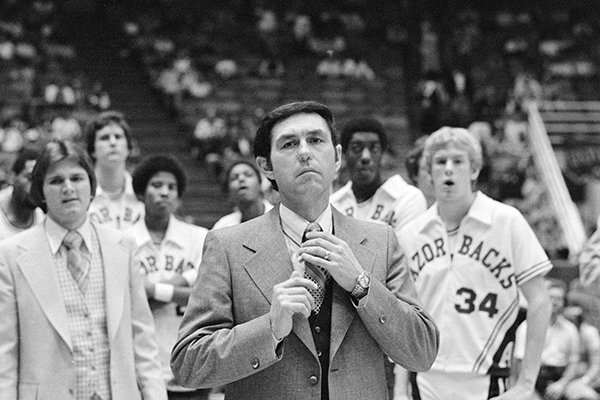It was a very good documentary.
Titled “Eddie,” the basketball history of Eddie Sutton was candid, touching and real.
When Sutton said with great conviction that the biggest mistake he had made in life was leaving the University of Arkansas, he said it with heartfelt emotion.
Sutton laid the foundation for Arkansas Razorbacks basketball.
He left the Razorbacks amid a personal battle with athletic director Frank Broyles, who wanted Sutton to seek help with his drinking.
Sutton was not ready to admit his problem. When Kentucky offered him a chance to be the head coach at the historic program, he more or less crawled there.
He had said he would crawl to that job, but that was a jab at Broyles. Sutton was reluctant to leave the Razorbacks, but Kentucky offered him a way to leave with his head held high.
That job was his undoing, and apparently it was worse than anyone knew.
During the documentary, former Kentucky players said he showed up for practice intoxicated.
That never happened at Arkansas, or at least not to the point it was obvious.
At Arkansas, Sutton and his family lived in a small fishbowl, but they were loved by neighbors and Razorback fans alike.
Whereas Razorbacks basketball had been an afterthought played in a gym with sawdust under the stands, Sutton’s success called for an update of Barnhill Arena that became “Barnhell” for opponents.
At Kentucky, the fishbowl was an aquarium, and Sutton was bigger than life. Every move was witnessed by someone.
That was and is Kentucky basketball. Some of the greatest fans have never seen a game in person but can recall the highest and lowest moments of the program like it was yesterday.
It was there that the pressure to win got to Sutton. He won, but he knew the expectations were to win every game and win them handily.
It took a toll on him and his relationship with his son Sean, who played point guard for the Wildcats and became a target for fans who wanted perfection.
The documentary touches on the part of their relationship where it seemed the more Eddie drank, the more critical he became of his son.
Sean was everyone’s target during those days.
When Sutton resigned at Kentucky under pressure of an NCAA investigation in which he was not cited, he took some time off and performed consulting work for Nike, going to schools and meeting with their coaches.
When he came to Little Rock, we had lunch. He asked whether he could get the UALR job.
He might have become a Trojan, but instead his alma mater, Oklahoma State, called and offered manna from heaven.
He was welcomed home like the basketball genius that he was. He was one of their own.
His best friend and wife, Patsy, was always by his side. This was a move both relished.
It was the perfect reunion, and Sutton led the Cowboys to some of their greatest heights on the basketball court.
No one knows why after all those years at OSU, including two Final Fours, he felt the irresistible draw to stop on his way home and buy a bottle.
Within an hour, he lost control of his car while intoxicated, and the police were called. It was the beginning of the final chapter for Eddie Sutton.
He did a short stint as an interim coach at San Francisco, then retired for good with an 806-326 record. He’s one of 25 coaches in the history of the game to win more than 800 games.
The documentary goes a little beyond the world of basketball, but mostly it was about Sutton and his ability to teach winning basketball everywhere he went.

